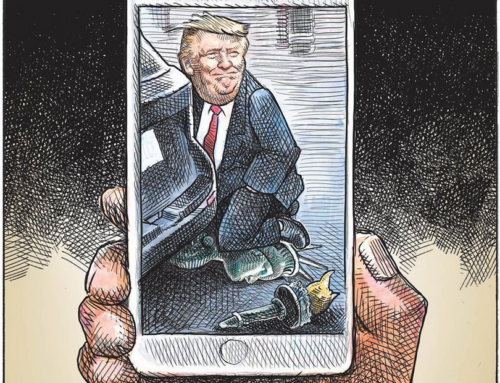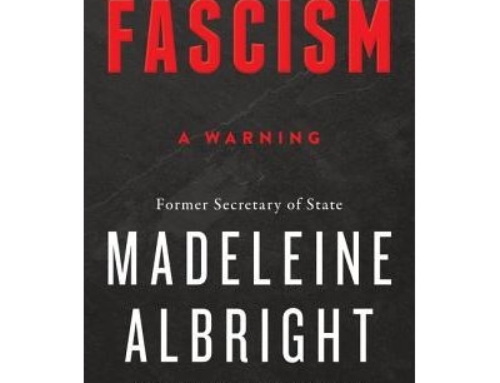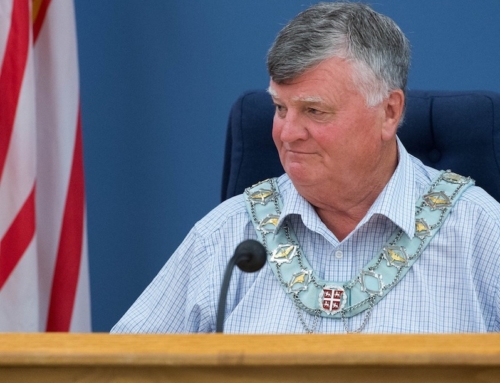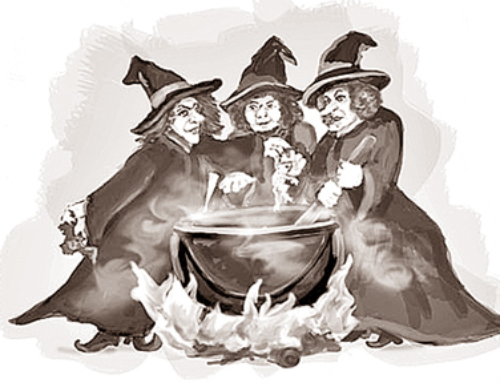 Is there hope for democracy in small towns?
Is there hope for democracy in small towns?
The metaphor of the moon landing is overused but it seems appropriate for a local historic event that happened just one week after the forty-fifth anniversary of the moon landing (July 20, 1969). That first step was on July 21, 1969 and on July 29, 2014, one small town with a lot of heart and hard work took a big step toward putting the hope back in its name and its future – and in the democratic process. Port Hope, Ontario, a community of about 17,000 people, an hour east of Toronto, just culminated two years of intense citizen participation into an exemplary demonstration of how democracy can work.
On July 29th Port Hope’s Council voted 7 to 0 to defeat a proposed change in its zoning laws that would have allowed a company, Entech-REM, to proceed with plans to build a mega-garbage incinerator on agricultural lands upwind from this historic town. The final vote, 7-0, appears decisive but in reality, it was far from decisive. It was the result of a protracted, problematic, divisive process that mirrored the maxim, “Those who do not stand on principle, eventually lie down and roll over.”
One principled vote
Of the seven members of Council only one, Councillor Greg Burns, stood on principle from day one. He stood up and spoke out against the proposed mega-incinerator based on the democratic principle of representing the wishes of the majority of citizens. In the end, he was the last man standing. It was his well-crafted, unequivocal motion against the zoning change that received the unanimous vote. But until the very end, the other elected officials raised only tepid questions and no opposition, despite thousands of opposing letters, emails, lawn signs and standing-room-only public meetings. They remained silent, hunkered down behind a trumped up claim that they had to follow a process. No! They are elected to lead, not follow procedure. Ironically, in the final days they were still following as the citizens led them to the right decision.
Eventually a reluctant vote
The resounding 7-0 vote was anything but resounding, it was finally, and reluctantly, voted for by the mayor and five other councilors when it was obvious they had no way out of the no-principled, no-guts, no-decision position they had created for themselves and were now caught in.
Without going into details, it began about five years ago when Entech-REM looked at building a mega-incinerator just outside Port Hope. There were two major hurdles: environmental approvals and a zoning change. Over two years ago, a small group of residents organized opposition to the proposal under the name, Port Hope Residents For Managing Waste Responsibly (PHR4MWR). Their opposition was fervent, articulate and thorough and they were not just against something, they were for, as their name states, “managing waste responsibly.” They attracted citizens from all walks of life, including: scientist, architects, medical doctors, lawyers, planners, farmers, homemakers and business people. They continually challenged Council, Entech-REM and a bevy of hired consultants, presenting well-researched, peer-reviewed data on environmental issues and questioning the planning process and countering many of the planning assumptions made by municipal staff. On Council, Greg Burns was the only voice to support this opposition.
Never doubt that a small thoughtful group of people can change the world. Indeed, it is all that ever has. – Margaret Mead, anthropologist
The group is testament to what is required from citizens in order to make democracy work: organization, purpose, passion, perseverance, knowledge, vision and leadership. It worked. Citizens got up off their couches, turned off their remotes, turned on their talents and turned out with a passion. This small thoughtful, talented group of people soon became a movement and lawn signs and a website popped up and pamphlets and people showed up on doorsteps. Most important, the knowledge, skills and passion of the citizens showed up. Hundreds attended meetings and many made articulate, knowledge-based presentations. And PHR4MWR met with just about everybody, from the Ministry of the Environment and MPPs to Northumberland County Council and every municipal council in the county.
Citizens vs Council
Of course, none of this would have been necessary had Council properly represented their constituents. Any three of them could have joined Councillor Burns and stopped the proposed incinerator long before July 29th 2014. They could have told the applicant that this type of business wasn’t welcome in our community, which was self-evident in the citizen opposition. Instead, they ignored public concerns and acted like Nero, fiddling while citizens burned. They allowed the community to struggle through a protracted and unnecessary battle, pitting a silent, non-committal Council against a far-from-silent, committed public. It was the citizens, not the elected officials, who saw what almost every man, woman and child in Port Hope saw. That this garbage incinerator was not right for the community. From a planning perspective it was the antithesis of what Port Hope’s Official Plan dictated. From an environmental perspective it didn’t even pass the smell test. And from a political perspective, it was an election-losing proposition. And yet, the collective intelligence of six Council members drifted for more than two years. Why?
Recently we had a partial answer. Mayor Linda Thompson announced she would not be running for re-election, which suggests that her tin ear for the public’s voice was because there was no political risk, and perhaps something to gain, in dragging this issue out. But it doesn’t explain why she would ignore the environmental and planning problems that would affect her constituents, her children and her grandchildren. Unless, there was some other short-term gain for her that was worth trading away long-term benefits for others? We may never know, but it will be worth watching to see where she ends up in the next few years because the political advancement of careers does become transparent over time.
When democracy works
People do care about their community but the majority take a “laissez faire” (lazy faire) approach to politics and leave it to the elected officials. That’s the first mistake. Leaving things to politicians is no different than leaving the classroom to the fifth graders or the brothel to sex maniacs with credit cards (our taxes are a politician’s credit card – with no credit limit). With rare exception, politicians respond versus lead. They respond to polls, to protests, to problems, staying within the safe boundaries of doing what will secure the next election. By nature they are not proactive, they are reactive and defend the status quo. There is no pushing the boundaries of the status quo and vision, innovation, risk and principles are not part of their vocabulary. The Port Hope Council, in the matter of this mega-incinerator, exemplified this sclerotic mindset and it was on full display in the final week of the process.
Leadership in our midst
Five days before the crucial vote there was a public meeting, which offered an opportunity for citizens to comment on the proposed zoning amendment and the Official Plan amendment. And comment they did. For five hours. Dozens and dozens of citizens lined up at three microphones to voice their opposition – there was not one supporter. It was revealed by one resident that records showed over 800 letters had been submitted to Council in opposition and only two were in support and 2,6000 opposing signatures had been gathered in a door-to-door campaign. More important than the quantity of comments was the quality. It was a teaching-moment – for Council. The superior expertise was not at the Council table, the staff table or the applicant’s table; it was at the microphones. Bright, knowledgeable, articulate, credentialed residents put forward a case that was not to be denied. Of course, there were a number of less articulate speeches but there were also numerous heart-felt, impassioned appeals to Council’s common sense, asking them to rethink their responsibility of doing what is right rather than what seems economically expedient.
Democracy’s flaw
The extensive expertise among the citizens demonstrated a fundamental flaw in democracy: Most of the time the best talent sits on the sidelines, leaving a vacuum in the political arena that gets filled by second-stringers. This is particularly true in small towns. In Port Hope, there were three lesson learned from the folly of the second-string incumbents.
- They ignored the right principle and right decision and followed the wrong procedure and the wrong decision (no decision), thereby, procrastinating until they were forced to decide – what they could have decided much earlier. Greg Burns set the example but was a solitary voice.
- When it comes to key issues (health, taxes, our children’s future), the citizens will stand up and lead and their expertise and capability will serve the best interests of the community. Unfortunately, it’s temporary and after the matter is resolved the expertise tends to go back to the sidelines and politics reverts to the less than stellar players.
- If we are to have a well-functioning democracy at the local level we must find a way to get the best talent in the game, all the time. No more second-stringers.
Citizens must step up
Short of waiting for the next big problem to bring out the community’s best, we need to find ways of marshaling the talent and resources needed to prevent rather than resolve problems. It will take some changes and those changes will only come from the citizens. The best and the brightest must become our elected officials and provide the leadership required to navigate the 21st century. If not, democracy will be sporadic, at best, working only when citizens take a stand on issues and stand up and lead the politicians to a democratic decision.
Fortunately for Port Hope, there is a glimmer of hope. But citizen involvement must not stop here, it must continue to flourish and the real leaders, who are prone to slipping back into the comfort of the silent majority must, instead, take responsibility. Step up. Step into the arena. Get elected. If not, this well-executed, small step for democracy will never become a “giant leap” toward a better community.






Leave A Comment